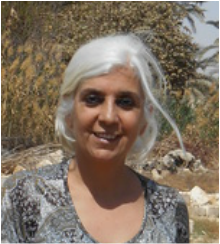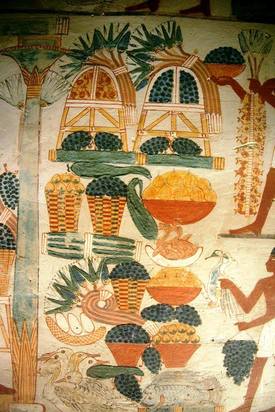|
We are what we eat:
A critical approach to food consumption in Egypt نحن والطعام: مدخل نقدي لإستهلاك الطعام في مصر Offered by Hala Barakat مقدم من هالة بركات On Monday mornings from 10:00 am to 12:30 pm and evenings from 5:30 pm to 8:00 pm ايام الإثنين في الصباح من ١٠:٠٠ صباحاً إلى ١٢:٣٠ ظهراً و في المساء من ٥:٣٠ إلي ٨:٠٠ مساءاً |
course description
The course explores issues related to food and its history, production and consumption in Egypt. Starting from questioning traditional concepts of food heritage to testing existing food systems and opening up to alternative ways of sourcing, preparing and eating our food to discovering and inventing sustainable food systems adapted to urban life…
During the course we shall discuss:
- History of food production in Egypt and “Egyptian” Food heritage
- Consumer awareness: what to eat? where to buy? what do we need to know about our food? who can help? how to assess information?
- Seasonal foods
- Cook your own food. Make your own food. Grow your own food
- Sustainable food systems
Through exchange, discussions, research and practical play, we shall be able to answer questions (and come up with some new ones) related to...
What is the food we eat? Where does it come from? Where did it originally come from? What happened till we have come to the current food available on our table?
Is there an Egyptian “food heritage”?
As far as food production and consumption is concerned: can we shape, better control or take things in our hands? as individuals, consumers and urban food producers?
Participants are expected to actively engage with all course material.
They are expected to do their own online and offline research to enrich the discussions during the sessions
They are expected to visit sites of interest: museums, markets, restaurants and food shops, search and read relevant books, watch movies, take photographs of food items, products, keep a record of impressions, observations, questions and bring them to class.
They are expected to be hands on with cooking, preparing and growing their food
The course explores issues related to food and its history, production and consumption in Egypt. Starting from questioning traditional concepts of food heritage to testing existing food systems and opening up to alternative ways of sourcing, preparing and eating our food to discovering and inventing sustainable food systems adapted to urban life…
During the course we shall discuss:
- History of food production in Egypt and “Egyptian” Food heritage
- Consumer awareness: what to eat? where to buy? what do we need to know about our food? who can help? how to assess information?
- Seasonal foods
- Cook your own food. Make your own food. Grow your own food
- Sustainable food systems
Through exchange, discussions, research and practical play, we shall be able to answer questions (and come up with some new ones) related to...
What is the food we eat? Where does it come from? Where did it originally come from? What happened till we have come to the current food available on our table?
Is there an Egyptian “food heritage”?
As far as food production and consumption is concerned: can we shape, better control or take things in our hands? as individuals, consumers and urban food producers?
Participants are expected to actively engage with all course material.
They are expected to do their own online and offline research to enrich the discussions during the sessions
They are expected to visit sites of interest: museums, markets, restaurants and food shops, search and read relevant books, watch movies, take photographs of food items, products, keep a record of impressions, observations, questions and bring them to class.
They are expected to be hands on with cooking, preparing and growing their food
رؤية عامة
يستكشف المساق القضايا المتعلقة بالطعام وتاريخه وإنتاجه وإستهلاكه في مصر. بدءً من مساءلة المفاهيم التقليدية حول تراث الطعام مرورًا بإختبار أنظمة الطعام الموجودة وفتح طرق بديلة لتوفير الطعام وتحضيره وأكله إلى اكتشاف وخلق أنظمة طعام مستدامة تلائم الحياة الحضرية.
نناقش خلال الدورة:
تاريخ إنتاج الطعام في مصر وتراث الطعام المصري
توعية المستهلك: ماذا نأكل؟ من أين نشتريه؟ وما الذي نحتاج إلى معرفته عن أكلنا؟ ومن يستطيع المساعدة؟ وكيف نقيم المعلومة؟
اﻷطعمة الموسمية
كيف تطبخ طعامك، وتصنع طعامك، وتزرع طعامك
أنظمة الطعام المستدامة
من خلال التبادل والمناقشة والبحث والتطبيق العملي، سنستطيع اﻹجابة على الأسئلة (ونستخرج بعض الأسئلة الجديدة) المتعلقة بـ:
ما الطعام الذي نأكله؟ من أين يأتي؟ وما هي أصوله؟ وهل هناك تراث للطعام المصري؟ وعلى قدر اهتمامنا بإنتاج الطعام واستهلاكه: هل يمكن أن نتحكم فيه بأنفسنا بشكل أفضل؟ كأفراد
مستهلكين ومنتجين حضريين له؟
نتوقع من المشاركين عمل أبحاثهم الخاصة اعتمادًا على شبكة اﻻنترنت والمراجع الورقية كي يثروا النقاشات خلال المحاضرات ونتوقع أيضًا زيارتهم ﻷماكن ذات أهمية كالمتحاف واﻷسواق والمطاعم ومحلات بيع الطعام والبحث عن مراجع (قراءات وأفلام) مرتبطة بالمساق وقراءتها ومشاهدتها وتصوير مأكولات متنوعة وتسجيل انطباعتهم وملاحظاتهم وأسئلتهم والقدوم بها إلى الفصل. وأخيرًا وليس آخرًا من الضروري أن يشاركوا في طبخ وتحضير وزرع طعامهم.
يستكشف المساق القضايا المتعلقة بالطعام وتاريخه وإنتاجه وإستهلاكه في مصر. بدءً من مساءلة المفاهيم التقليدية حول تراث الطعام مرورًا بإختبار أنظمة الطعام الموجودة وفتح طرق بديلة لتوفير الطعام وتحضيره وأكله إلى اكتشاف وخلق أنظمة طعام مستدامة تلائم الحياة الحضرية.
نناقش خلال الدورة:
تاريخ إنتاج الطعام في مصر وتراث الطعام المصري
توعية المستهلك: ماذا نأكل؟ من أين نشتريه؟ وما الذي نحتاج إلى معرفته عن أكلنا؟ ومن يستطيع المساعدة؟ وكيف نقيم المعلومة؟
اﻷطعمة الموسمية
كيف تطبخ طعامك، وتصنع طعامك، وتزرع طعامك
أنظمة الطعام المستدامة
من خلال التبادل والمناقشة والبحث والتطبيق العملي، سنستطيع اﻹجابة على الأسئلة (ونستخرج بعض الأسئلة الجديدة) المتعلقة بـ:
ما الطعام الذي نأكله؟ من أين يأتي؟ وما هي أصوله؟ وهل هناك تراث للطعام المصري؟ وعلى قدر اهتمامنا بإنتاج الطعام واستهلاكه: هل يمكن أن نتحكم فيه بأنفسنا بشكل أفضل؟ كأفراد
مستهلكين ومنتجين حضريين له؟
نتوقع من المشاركين عمل أبحاثهم الخاصة اعتمادًا على شبكة اﻻنترنت والمراجع الورقية كي يثروا النقاشات خلال المحاضرات ونتوقع أيضًا زيارتهم ﻷماكن ذات أهمية كالمتحاف واﻷسواق والمطاعم ومحلات بيع الطعام والبحث عن مراجع (قراءات وأفلام) مرتبطة بالمساق وقراءتها ومشاهدتها وتصوير مأكولات متنوعة وتسجيل انطباعتهم وملاحظاتهم وأسئلتهم والقدوم بها إلى الفصل. وأخيرًا وليس آخرًا من الضروري أن يشاركوا في طبخ وتحضير وزرع طعامهم.

Hala BARAKAT has a Ph.D. in Paleoecology from the University of Aix-Marseille III, France. She worked as a lecturer at Cairo University 1995-2000 and acted as deputy director at the Center for Documentation of Cultural and Natural Heritage (CULTNAT) affiliated to the Library of Alexandria. She was in charge of the documentation of the natural heritage program as well as supervising the photographic heritage, folkloric heritage and musical heritage programs at CULTNAT (2000-2012). In January 2013, Hala joined the Egyptian Initiative for Personal Rights (EIPR) as a part time researcher on the issues of “Right to Food” and “Food Sovereignty” in Egypt. She is also a founding member and former president of Nature Conservation Egypt (NCE) a non profit organization active in the field of conservation of endangered species and habitats and raising awareness to environmental issues in Egypt. Hala is also a certified Sivananda Yoga teacher and master. As a trained botanist, she has long had deep interest and knowledge in Naturopathy, Homeopathy and vegetarianism which complement her interest in yoga as a lifestyle.
هالة بركات حاصلة على الدكتوراه في علم الحفريات. وعملت كمحاضرة في جامعة القاهرة بين عامي 1995 و2000. كما عملت كنائب مدير مركز توثيق التراث الطبيعي والحضاري التابع لمكتبة الإسكندرية ومسئولة عن برنامج توثيق التراث الطبيعي والإشراف على برنامج التراث الفوتوغرافي والفلكلوري والموسيقي في المركز (2000 - 2012). في يناير 2013، انضمت هالة للمبادرة المصرية للحقوق الشخصية كباحثة بدوام جزئي على قضايا الحق في الطعام في مصر. كذلك هي عضو مؤسس ورئيس سابق لمنظمة الجمعية المصرية لحماية الطبيعة، وهي منظمة غير هادفة للربح تعمل في مجال الحفاظ على الأجناس المعرضة للإنقراض ورفع الوعي بالقضايا البيئية في مصر.
هالة بركات أيضًا مرشدة ومعلمة يوجا السيفاناندا، وتحوز معرفة واهتمامًا كعالمة نباتات في المعالجة التجانسية والمداواة الطبيعية والأكل النباتي الذي يكملان اهتمامها في اليوجا كأسلوب حياة. والآن تدير وتعطي دروسًا في "استوديو روحانا" بالقاهرة وما زالت في تقديم الإستشارات البيئية والبحث في قضايا الطعام.
هالة بركات أيضًا مرشدة ومعلمة يوجا السيفاناندا، وتحوز معرفة واهتمامًا كعالمة نباتات في المعالجة التجانسية والمداواة الطبيعية والأكل النباتي الذي يكملان اهتمامها في اليوجا كأسلوب حياة. والآن تدير وتعطي دروسًا في "استوديو روحانا" بالقاهرة وما زالت في تقديم الإستشارات البيئية والبحث في قضايا الطعام.


